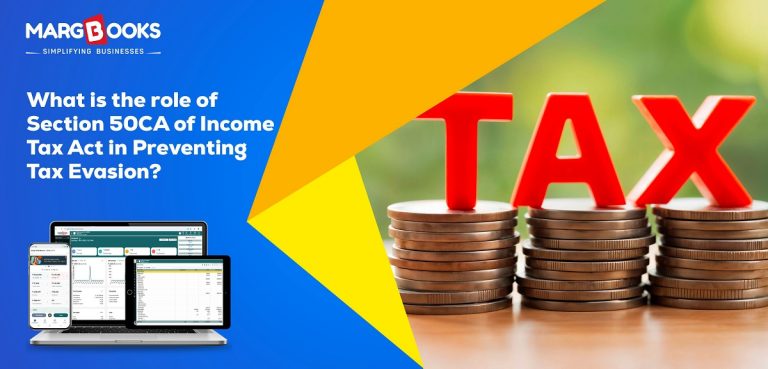The Indian taxation system has witnessed significant reforms over the years, and one of the critical aspects of these reforms is preventing tax evasion. The Income Tax Act of 1961 includes various provisions aimed at curbing tax evasion and ensuring transparency in financial transactions. One such important provision is Section 50CA, which has been instrumental in curbing the misuse of undervaluation of assets in business transactions.
This blog post will delve into the significance of Section 50CA of Income Tax Act and its role in preventing tax evasion. Alongside, we’ll explore how Cloud Based GST Software and online accounting software can complement the provisions of this section to ensure better compliance and ease of reporting.
What is Section 50CA of Income Tax Act?
Section 50CA of the Income Tax Act was introduced by the Finance Act, 2020, as part of the government’s ongoing efforts to tackle tax evasion in the realm of corporate financial dealings. This section specifically addresses the issue of the undervaluation of shares when they are transferred at a price below their fair market value (FMV).
The primary objective of Section 50CA is to prevent businesses from transferring shares of a company at a price lower than their FMV to reduce their tax liabilities. Essentially, it ensures that the tax liability is calculated based on the FMV of the shares rather than the lower transaction price, thereby reducing the opportunity for businesses to manipulate share prices and evade taxes.
Key Provisions of Section 50CA
- Applicable to Transfer of Shares: Section 50CA applies when the transfer of shares occurs, particularly in closely held companies or private limited companies, where such transfers are often underpriced.
- Calculation of Fair Market Value (FMV): If the transfer price of shares is lower than the FMV, the FMV of the shares will be considered as the transaction value for calculating capital gains tax. This ensures that any gain arising from the transfer of shares is taxed at the correct value, regardless of whether the shares were sold at a discounted price.
- Scope of Provisions: The section primarily targets situations where shares are transferred to related parties (e.g., between family members or within the same group of companies) at a price below the FMV, thereby preventing tax evasion strategies.
- Implications for Taxpayers: In case the transfer price is found to be less than the FMV, the tax authorities will calculate capital gains tax based on the FMV of the shares, effectively closing the loophole for tax evasion.
How Section 50CA Prevents Tax Evasion?
Section 50CA is critical in the fight against tax evasion because it addresses a loophole that could otherwise be exploited by businesses. By underpricing shares, companies could manipulate their financial statements, show reduced profits, and thereby lower their tax liabilities.
Here’s how Section 50CA helps in curbing tax evasion:
- Eliminates Undervaluation: Section 50CA ensures that companies cannot transfer shares at a price lower than their FMV, thus preventing undervaluation. This is particularly useful in preventing businesses from shifting assets at discounted prices to evade taxes.
- Ensures Transparency: By pegging the tax liability to the FMV of shares, the provision promotes transparency in corporate transactions. This ensures that tax authorities can more easily track the true value of shares and other assets.
- Prevents Misuse of Related Party Transactions: In many cases, undervaluation is done through related party transactions. Section 50CA prevents this misuse, ensuring that both public and private companies adhere to proper valuation norms.
- Promotes Fair Market Practices: By enforcing the FMV rule, the provision supports fair market practices and prevents the manipulation of share prices, which could result in tax evasion or underreporting of income.
Complementing Section 50CA with Cloud-Based GST Software and Online Accounting Software
While Section 50CA of Income Tax Act plays a vital role in preventing tax evasion, businesses can further increase the compliance efforts by leveraging Cloud Based GST Software and online accounting software. Here’s how these technologies can help businesses stay compliant and reduce the chances of inadvertent mistakes:
Cloud-Based GST Software
- Real-time Updates: Cloud-based GST software helps businesses stay up-to-date with the latest GST rules and regulations, ensuring that transactions are recorded accurately and in compliance with the law.
- Seamless Tax Filing: By automating GST returns and reconciling transactions, this software ensures that businesses file their taxes accurately and on time, minimizing the risk of non-compliance or errors that could attract penalties.
- Preventing Tax Evasion: The software ensures proper documentation and validation of GST-related transactions, thus preventing the misreporting of transactions or undervaluation, which could potentially lead to tax evasion.
Online Accounting Software
- Accurate Valuation of Assets: Online accounting software can help businesses calculate the FMV of shares and other assets accurately, reducing the risk of undervaluation and ensuring compliance with Section 50CA.
- Audit Trail: These platforms offer a detailed audit trail of all financial transactions, which makes it easier for businesses to track and report their financial activities accurately. This helps in preventing the manipulation of share prices or asset transfers.
- Efficient Reporting: By maintaining accurate books, businesses can ensure that they report their financial statements correctly, thereby avoiding the risk of tax evasion under Section 50CA.
How MargBooks Can Help?
One excellent example of such online accounting software is Margbooks, which simplifies accounting and GST compliance for businesses of all sizes. With Margbooks, users can efficiently manage their transactions, maintain accurate financial records, and comply with tax laws like Section 50CA without hassle.
Margbooks offers:
- Automated GST calculations to ensure correct tax reporting.
- Real-time invoicing and inventory management for smooth business operations.
- Cloud-based access, making it easy for businesses to manage their accounts from anywhere.
- Customizable reports to help businesses track the value of assets and shares and comply with FMV guidelines.
Conclusion
Section 50CA of Income Tax Act plays a crucial role in preventing tax evasion by ensuring that shares and assets are not undervalued during transfers. Enforcing the FMV rule prevents businesses from manipulating transaction prices to evade taxes. To complement this, leveraging tools like Cloud Based GST Software and online accounting software can help businesses maintain transparency, comply with tax laws, and ensure accurate reporting.
In today’s digital age, Margbooks offers an ideal solution for businesses to automate their accounting processes and stay in line with the latest tax regulations. By combining these modern tools with the provisions of Section 50CA, businesses can significantly reduce the chances of tax evasion and ensure they remain on the right side of the law.
By adopting these strategies and technologies, businesses not only protect themselves from tax liabilities but also contribute to a more transparent and compliant financial ecosystem.




